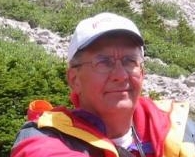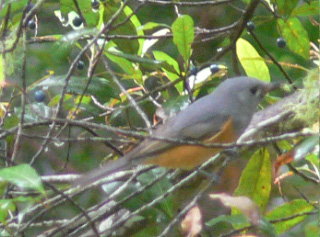 |
|
||||||||||||||
| Links to Notebook Pages: | Literature |
Wednesday April 05, 2006 6:30 am Ballina NSW
A. Morning Musings
B. Plan6:30 am There is a light rain at the moment. We are planning to go bird watching this morning with a local birder. I am not sure if this will mean a change in plans.
I began reading Bruce Chatwin's book "What Am I Doing Here?" which is a collection of short essays that he compiled shortly before his death.
Chores:
C. Actual
6:45 am Here are a few quotes from the Chatwin book:
- "They are the eyes of a man who has never known the meaning of dishonesty." [p. 9]
- "Whoever presumes to mock feng-shui as a superstitious anachronism should recall its vital contribution to the making of the Chinese landscape, in which houses, temples and cities were always sited in harmony with trees and hills and water. Perhaps one can go one step further? Perhaps the rootedness of Chinese civilization; the Chinese sense of belonging to the Earth; their capacity to live without friction in colossal numbers - have all, in the long run, resulted from their adherence to the principles of feng-shui?" [p. 52]
- " And isn't it also true that traditional Chinese buildings are almost always curved? The roofs are curved? The walls are curved? ... Chinese architecture - like Chinese art, Chinese language and the Chinese character - abhors the rigid and rectilinear." [p. 54]
- "The males of Homo sapiens were hunters and the women were gatherers of vegetable food and small game. But the function of their journeys was to make friendly contact with neighbours near and far. Men talk their way through the problem of inbreeding. Animals fight to achieve this." [p. 64 - 65]
- "Man is a talking creature, a singing creature. He sings and his song echoes up and down the world. The first language was in song. Music is the highest of the arts." [p. 65]
- "Kevin made several recording trips to Southern Africa. He began with street-music and immediately realised it was far more interesting than any ideas about it." [p. 68]
- "He seems to have understood, even then, that the Indian artists' sense of colour and composition offered a way out of the muddy impasse of most English painting." [p. 72]
- "To the boy who had breathed the air of excellence in the Museum of Modern Art, the insularity and 'know-all' attitudes of the English were insufferable." [p. 73]
- "Already there were signs of that wilful vulgarity with which people of faultless taste protect themselves from faultless taste." [p. 76]
- "So important was it to keep the working force in passive dependence, that this knowledge became the exclusive property of a caste of managerial bureaucrats, the futurologists of the ancient world. These were men morbidly wrapped-up in themselves and responsible to nothing but the system ... " [p. 97 - 98]
- "But I would never get to the centre of the radii, so what is the point?" [p. 100]
- "In his daybooks, crammed with sketches, you could watch him anticipate and race through every style and variation of the post-war abstract movement in Europe and America." [p. 105]
- "This institution, Mayakovsky once said, was the 'only place where they took you without proof of your reliability'. " [p. 108]
- "They knew as fact that nations will usually act nationalistically and were unimpressed by specious internationalism." [p. 117]
- "Malraux is alone. ... He never allowed himself the luxury of a final political or religious creed, and is too restless for the discipline of academic life." [p. 119]
- " 'I think,' I said, 'you're suggesting we revert to type. At heart we are an island of buccaneers and pirates.'
'Et joyeux! Tell me,' he said, smiling, 'when did the English stop talking about Merry England?'
We could not decide. Chaucer, we said, was real Merry England. Drake was still England. But the Puritans were melancholic, not merry. And Merry England certainly didn't survive the Industrial Revolution." [p. 122]
- "Malraux once described Lawrence as the 'first liberal hero of the West'..." [p. 123]
- "When the French fight for mankind they are wonderful. When they fight for themselves, they are nothing." [p. 130]
- "In France intellectuals are usually incapable of opening an umbrella. ... The classic French intellectual is the homme de bibliotheque, the writer in his library, a tradition that begins with Voltaire - and is in fact untrue because Voltaire took extremely strong political positions." [p. 133]
- "He is a pure man, I don't doubt. There is no corruption in him, but there is corruption in the state and their difficulties are gigantic. But I, for one, am not too pessimistic. When in our time you do not have a totalitarian government, the action of the individual at a local level is strong enough to create an organization." [p. 134]
- "He was also the only person with whom I could have a one-to-one conversation on what I would call the sacramental aspect of walking. ... 'Walking is virtue, tourism deadly sin.' " [p. 138 - 139]
There is something special and soothing about making a few notes in the early morning with the sound of light rain in the background. 7:40 am
5:00 PM Our birding trip turned out to be a real winner. We saw the following birds, all from the verandah of a lovely house nestled in the forest:
- Eastern Yellow Robin
- Rufous Fantail [lifer]
- Grey Fantail
- Rufous Whistler [lifer]
- White-headed Pigeon
- Drongo
- White-throated Treecreeper
- Golden Whistler (male)
- Black-faced Monarch (female) [lifer]
- Lewin's Honeyeater
- Little Shrike-thrush [lifer]
- Grey Shrike-thrush [lifer]
- Brown Thornbill [lifer]
- Red-browed Finch.
Then while walking near the mouth of the Richmond river we saw a Satin Flycatcher [another lifer] in the coastal heath scrub.
D. Reflection



